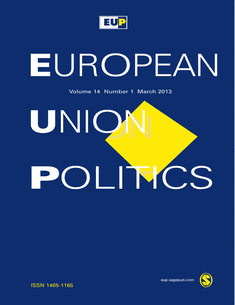
EUROPEAN UNION POLITICS
Scope & Guideline
Decoding EU Policies for Global Impact
Introduction
Aims and Scopes
- European Integration Dynamics:
Research exploring the processes and impacts of European integration, including the political, economic, and social dimensions that shape member states' policies and public attitudes towards the EU. - Public Opinion and Attitudes:
Studies focused on understanding how public perceptions, opinions, and attitudes towards the EU and its policies evolve, particularly in response to crises, elections, and socio-economic changes. - Political Behavior and Representation:
Investigations into the political behavior of EU institutions, political parties, and citizens, emphasizing electoral outcomes, representation, and participation in EU governance. - Policy Analysis and Governance:
Analyses of EU policy-making processes, compliance, and the effectiveness of various governance structures, including the role of the European Parliament and the Commission. - Migration and Asylum Policies:
Research addressing the complexities of migration and asylum policies within the EU, examining public attitudes, policy responses, and the implications for European solidarity. - Crisis Responses and Resilience:
Explorations of how the EU responds to various crises, including economic downturns, migration challenges, and health emergencies, and the implications for its institutional structure and public trust.
Trending and Emerging
- Impact of Crises on EU Policy and Public Perception:
There is a notable increase in research examining how various crises (e.g., COVID-19, migration, economic downturns) influence EU policy-making and reshape public perceptions of the EU. - Differentiated Integration:
Emerging studies are increasingly focusing on differentiated integration within the EU, exploring how varying levels of integration impact member states and public support for the EU. - Role of Digital Communication in Politics:
The significance of digital communication strategies in shaping political narratives and public engagement in EU politics is gaining attention, reflecting the importance of social media and online platforms. - Intersection of Gender and Politics:
There is a rising interest in exploring the intersections of gender, politics, and representation within the EU, particularly concerning voting behaviors and party dynamics. - Transnational Solidarity and Cooperation:
Research is increasingly examining themes of transnational solidarity, particularly in the context of migration and crisis responses, highlighting the importance of collective action among member states.
Declining or Waning
- Historical Analyses of EU Integration:
There appears to be a waning interest in purely historical analyses of EU integration processes, as more contemporary issues and their immediate impacts take precedence in research. - Theoretical Frameworks on EU Governance:
Research that relies heavily on traditional theoretical frameworks without adapting to new developments in EU politics is declining, as scholars seek more dynamic and relevant approaches. - Regional Focus on Specific Member States:
Papers focusing solely on specific member states' roles within the EU without broader comparative analyses or implications for the EU as a whole are becoming less common. - Static Views of Public Sentiment:
Research that treats public sentiment towards the EU as static or unchanging is decreasing, with a shift towards understanding the fluidity and complexity of public attitudes. - Simplistic Narratives of Euroscepticism:
Studies presenting a simplistic view of Euroscepticism without considering the underlying socio-economic and political factors are less frequent, reflecting a move towards nuanced analyses.
Similar Journals

Romanian Journal of European Affairs
Fostering innovative research in political science and international relations.Romanian Journal of European Affairs is an esteemed open-access academic journal published by the EUROPEAN INST ROMANIA, dedicated to advancing research in the fields of political science and international relations. Established in 2001, the journal has positioned itself at the forefront of European studies, encompassing a diverse range of topics pertinent to the evolution of European policies and their global implications. With an impact factor substantiated by its Q3 ranking in the 2023 category of Political Science and International Relations, the journal stands at a pivotal intersection for researchers, practitioners, and students alike. Its Scopus ranking reflects a growing presence in the scholarly community, making it an essential platform for disseminating innovative research and fostering academic discourse. Based in Bucharest, Romania, the journal not only caters to local scholars but also engages a global audience interested in the dynamic interplay between European affairs and international contexts. By facilitating open access to its content, the Romanian Journal of European Affairs strives to enhance the visibility and impact of research, contributing significantly to the academic dialogue surrounding European integration and policy development.
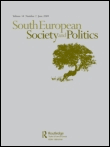
South European Society and Politics
Exploring the Dynamics of Southern Europe's Society and PoliticsSouth European Society and Politics, published by Routledge Journals, Taylor & Francis Ltd, is an esteemed academic journal focusing on the intricate dynamics of society and political frameworks in Southern Europe. With an ISSN of 1360-8746 and an E-ISSN of 1743-9612, this journal stands out with its notable impact in the field, achieving a Q1 ranking in both Sociology and Political Science categories as of 2023. Spanning from 1996 to 2024, it provides a critical platform for researchers, professionals, and students aiming to explore contemporary societal issues, political trends, and governance strategies within Southern European contexts. Although not an open-access journal, it maintains a rich repository of scholarly articles that are essential for anyone delving into the complexities of Southern European socio-political landscapes. With a Scopus rank placing it in the top 10th percentile among the 1466 journals in the field, South European Society and Politics is a crucial resource for fostering academic discourse and advancing knowledge in this vital area of study.
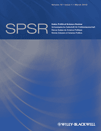
Swiss Political Science Review
Leading the Charge in Political Science ResearchSwiss Political Science Review, published by WILEY, stands at the forefront of political science discourse, reflecting a strong commitment to scholarship since its inception in 1995. With an impressive impact factor and ranking in the Q1 category of political science and international relations, this journal plays a pivotal role in advancing research and analysis of contemporary political issues. Covering a diverse range of topics from governance and policy analysis to international relations, the journal provides a vital platform for researchers, professionals, and students alike, fostering interdisciplinary dialogue and innovative perspectives. Accessible to a global audience, Swiss Political Science Review continues to shape the contours of political science scholarship and is an essential resource for those seeking to contribute to the field. The journal's ISSN is 1424-7755, and its E-ISSN is 1662-6370, ensuring its availability to the academic community worldwide.

EUROPEAN JOURNAL OF POLITICAL RESEARCH
Fostering Critical Dialogue in Political ResearchEUROPEAN JOURNAL OF POLITICAL RESEARCH, published by Wiley, stands as a leading platform for scholarly discourse within the realms of sociology and political science. This esteemed journal, identified by its ISSN 0304-4130 and E-ISSN 1475-6765, has maintained a rigorous academic standard since its inception in 1973 and continues to publish until 2024. Ranked in the top 2% of its field, it is categorized as Q1 in both Sociology and Political Science, reflecting its position at the forefront of impactful research. With a prestigious Scopus rank of #32 out of 1,466 journals, the EUROPEAN JOURNAL OF POLITICAL RESEARCH is essential for researchers, professionals, and students looking to deepen their understanding of contemporary political phenomena and sociological theories. Although the journal does not currently offer open access, its contributions are vital for anyone engaged in serious academic exploration of political research, providing readers with insights that shape practices and policies across Europe and beyond.
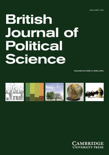
BRITISH JOURNAL OF POLITICAL SCIENCE
Shaping the future of political science with innovative research.Welcome to the British Journal of Political Science, a prestigious publication fostered by Cambridge University Press. Since its inception in 1971, this journal has become a cornerstone of scholarly discourse in the field of political science, consistently achieving an impressive ranking in the Q1 category for both Political Science and International Relations as well as Sociology and Political Science, as evidenced by the 2023 metrics. With an impressive Scopus rank of #15 out of 706, placing it in the 97th percentile among its peers, the journal is dedicated to publishing innovative research that shapes current debates and advances academic understanding of political systems, behavior, and theory. While it currently does not operate under an open access model, the journal ensures that vital insights and rigorous analyses are shared with the global academic community. The British Journal of Political Science remains an essential resource for researchers, professionals, and students eager to engage with cutting-edge scholarship in political science.
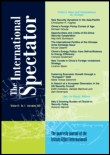
International Spectator
Navigating the Intricacies of International Relations.International Spectator, published by Routledge Journals, Taylor & Francis Ltd, stands as an eminent peer-reviewed journal in the field of Political Science and International Relations. Established in 1983 and continuing its impactful discourse through 2024, the journal boasts a commendable Q1 ranking in 2023, confirming its position among the top-tier journals within its discipline. With a Scopus ranking of 121 out of 706, it lies in the 82nd percentile, showcasing the robustness of its scholarly contributions. Although not designated as an open-access journal, International Spectator remains essential reading for researchers, professionals, and students seeking to navigate the complexities of international politics. The journal aims to publish high-quality research that engages with global political dynamics, providing a platform for innovative ideas and critical analyses that shape the understanding of international relations today.

Revista General de Derecho Europeo
Empowering Insights into Contemporary Legal ChallengesRevista General de Derecho Europeo is a prestigious academic journal dedicated to the study of European law, published by IUSTEL, a notable publisher recognized for its commitment to legal scholarship. This journal serves as a vital platform for the dissemination of cutting-edge research, fostering dialogue among scholars, practitioners, and policymakers in the field of European legal studies. With an ISSN of 1696-9634, it provides no-cost access to a diverse range of articles, ensuring that the latest developments in European jurisprudence are readily available to a broad audience. Although specific impact metrics such as the H-index are not detailed, the journal’s emphasis on quality and relevance positions it as an essential resource for anyone engaged in exploring the complexities of European law, its implications, and its evolution within a global context. Revista General de Derecho Europeo not only contributes to academic discourse but also equips its readers with critical insights necessary for navigating contemporary legal challenges in Europe.

Cuadernos Europeos de Deusto
Illuminating Emerging Trends in European ScholarshipCuadernos Europeos de Deusto is a distinguished academic journal published by UNIVERSIDAD DEUSTO, specializing in the interdisciplinary fields of Cultural Studies, History, Law, Political Science, and Economics. With its ISSN 1130-8354 and E-ISSN 2445-3587, the journal has made significant strides in fostering scholarly discourse since it became an Open Access publication in 2016, ensuring that research is accessible to a wider audience. Based in Bilbao, Spain, it encompasses a global perspective on European studies and seeks to highlight critical issues and emerging trends in its scope, actively pursuing the convergence of research from 2017 to 2024. The journal's impact is reflected in its rankings across various disciplines, with notable presence in the Scopus database, particularly in the fields of History and Cultural Studies, underscoring its value to researchers and students alike. With its commitment to scholarly excellence and engagement, Cuadernos Europeos de Deusto is a vital resource for those seeking to advance their understanding of European cultural and social dynamics.

Contemporary Europe-Sovremennaya Evropa
Advancing Insights into Europe's Evolving ChallengesContemporary Europe-Sovremennaya Evropa is a leading academic journal published by ROSSIIKAYA AKAD NAUK, INST EVROPY that delves into the intricacies of European political, economic, and social landscapes. With an ISSN of 0201-7083, this journal caters to an essential niche within Social Sciences, particularly focusing on Political Science and Economics. The journal holds a commendable Q3 ranking in both Economics and Econometrics and Political Science and International Relations, reflecting its commitment to disseminating high-quality research relevant to contemporary challenges in Europe. As part of its mission, Contemporary Europe seeks to provide scholars, practitioners, and policy-makers with empirical insights and theoretical frameworks that enhance understanding and foster dialogue in a rapidly evolving geopolitical landscape. Although currently not categorized as Open Access, the journal continues to strive for broader academic reach and accessibility. With a convergence of content from 2016 to 2024, it addresses pressing issues and trends, establishing itself as a valuable resource for those interested in European studies.
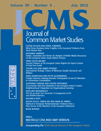
JCMS-Journal of Common Market Studies
Advancing Knowledge in Economics and Political ScienceAbout JCMS - Journal of Common Market Studies
Published by Wiley, the JCMS - Journal of Common Market Studies has been at the forefront of research in economics, political science, and international relations since its inception in 1962. With an impressive track record, the journal holds a Q1 ranking in multiple categories, including Business and International Management, Economics and Econometrics, and Political Science, reflecting its esteemed position in the academic community. As of 2023, it ranks 52nd out of 706 in Political Science and International Relations and 155th out of 716 in Economics and Econometrics. The journal aims to provide insightful analyses and comprehensive studies on common market integration and its implications on business practices and policies globally. Although it operates under a traditional access model, the content it disseminates is invaluable for researchers, practitioners, and students aiming to deepen their understanding of market dynamics and cross-border collaborations. With plans to continue exploring emerging trends up to 2024 and beyond, JCMS remains a vital resource for advancing knowledge in these critical fields.